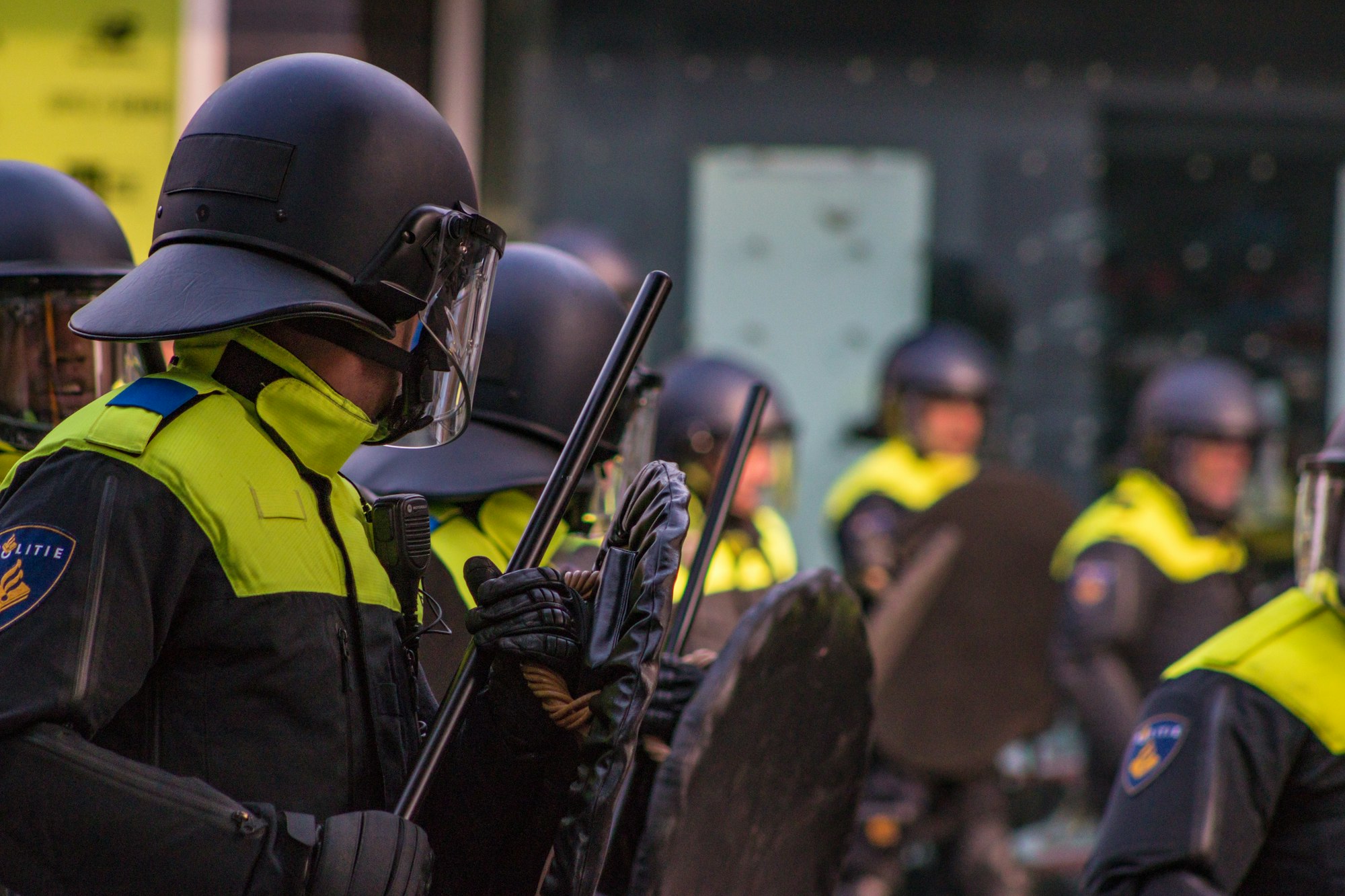A few weeks ago, on a Friday night, helicopters flew on and off over my apartment in the city center of Rotterdam. This is not unusual, since one of the largest hospitals in the Netherlands is just around the corner and its platform for emergency-aid helicopters is heavily used, but, as the sound of sirens of the police and firebrigade filled the air, I realized that something else was going on. News outlets soon started to report major riots on the Coolsingel, one of the main streets. Police cars were torched, stones and fireworks were thrown at the police and firemen. The police lost control over the city center, fired warning shots, and even shot rioters in the legs out of self-defence. 400 special police forces from Rotterdam and other cities entered the scene. At 1 am, Mr Aboutaleb, the mayor, declared that order had been restored. On Saturday morning, the Coolsingel was described by some as a warzone. It was, at the very least, a terrible mess.
The riot had started as a protest against the latest round of Covid-19 restrictions (which had entered into force on 13 November 2021), and against the Government’s plan to introduce 2G-legislation (which would only grant Covid-19 access passes to those vaccinated or recently recovered from Covid-19). Such protests against Covid-19 restrictions had been going on for a while during weekends, but had routinely drawn just a few dozen protesters and were barely noticed. How this protest turned into what Aboutaleb called an 'orgy of violence' appears to have had several causes. Some radical groups opposed to the Government’s Covid-19 policy - Freedom Demo Rotterdam, Dockers United, and Defend Nederland - had called for violence. The weather was clement and many young people who were in town for late night-shopping or for a drink were out on the street at 8 pm, when everything had closed because of Covid-19 restrictions. For some, playing cat and mouse with the police was more exciting than hanging around. Football hooligans, angry because of a plan to replace the existing stadium with a new one, and about the announcement a week before that football games, yet again, had to be played without public, joined the fight. The next two nights, several other cities in the Netherlands also witnessed outbursts of violence, albeit much less extreme. As the week began, it became quiet again.
But while the Netherlands is not on the verge of violent breakdown over Covid-19 restrictions, the situation is far from uplifting either. In fact, the last few weeks have been among the worst since the beginning of the pandemic. From 16 to 23 November 2021, the number of new Covid-19 patients in hospital increased by 19% compared to the week before, and the number of new Covid-19 patients in ICU increased by 26%. There was an increase of new positive tests of 39%, equivalent to 153,957 new cases, the highest number recorded in the Netherlands since June 2020, when testing first became possible for everyone.
Patience with the Government’s policy is wearing thin. Since spring 2020, the National Institute for Public Health and the Environment has monitored compliance with and support for Covid-19 restrictions. The most recent numbers are not looking good. Support for basic restrictions – physical distancing, work from home, get tested in case of complaints, etc – is at low levels compared to the winter of 2021. Compliance with restrictions is slowly rising again, but still significantly less than last winter. According to a recent report, only 25% of the population have a favorable view of the Government’s Covid-19 policy (against 70% at the beginning of the pandemic) and only 50% accept the policy as fair (against 80% at the beginning of the pandemic).
The health care system is overburdened. Take Limburg, the most southern province, in between Belgium and Germany. Last week, one in 50 people (the province has 1.1 million inhabitants) tested positive for Covid-19, the highest number both in the Netherlands and in Europe. In a recent interview, Mr David Jongen, executive director of Zuyderland, the largest hospital in the region, summed up his headaches: doctors are cancelling operations once again, including cancer treatment; personnel is threatened by frustrated patients and family; solidarity is not what it used to be as hospitals across the country don’t accept as many Covid-19 patients from Limburg as they could; sick-leave among nurses and doctors has increased to 11.3%; some secondary schools are closing because of Covid-19 among children and teachers, adding to the stress of parents among medical personnel; doctors feel bad about their work as they are discouraged from admitting patients who they would take in under normal circumstances. The story is pretty much the same elsewhere. Hospitals and health experts warned last week that ‘code black’, ie when hospitals do not have enough ICU capacity and are forced to choose which patients receive healthcare on non-medical grounds, is imminent. The police have warned that the army needs to be deployed to keep law and order when 'code black' is activated.
So what’s next? The Government has issued two sets of Covid-19 restrictions in two weeks. Since Sunday 28 November 2021, the Netherlands is in a new type of lockdown: everything except essential shops (supermarkets, pharmacies) and schools is closed from 5 pm to 5 am for at least the next three weeks (essential shops close at 8 pm); physical distancing and facemasks in public places have become mandatory again, etc. A EUR 2.2 billion support package has been introduced to lower the economic impact on businesses and workers. The main aim is to avoid 'code black', relieve the pressure on the health care system, and protect vulnerable persons.
But people are increasingly wondering why these measures and the immense economic and societal cost they carry are necessary when 84.9% of the over 17 years old are fully vaccinated?
Until last week, the Dutch Government did not critically discuss the situation of the unvaccinated, fearing that it would provoke polarisation among the population. Moreover, one of the coalition partners in the current caretaker Government, which is also engaged in talks to form a new Government, is the Christian Union, a political party which has strong reservations against 2G and is firmly against mandatory vaccination. In addition, the Government and many political parties lacked the courage to vigorously challenge the online and offline disinformation campaigns of anti-vaxxers, conspiracy theorists, and Forum for Democracy, an extreme right-wing party in Parliament. As a consequence, the Government kept pretending that it was somehow possible to preserve the freedom of choice of the unvaccinated, avoid 'code black', and allow society to more or less carry on.
This has now come to an end. Following op-eds in major newspapers, angry criticism of antivaxxers on Twitter and on evening talkshows earlier in the week, the Minister of Health came close to blaming the unvaccinated for the current crisis during Friday 26 November 2021's press conference, which was watched by 4.4 million people (the Netherlands has about 17.5 million inhabitants): '50% of the people in hospital [for Covid-19 treatment] are not vaccinated [...]. I think that we prevaricate about this in political and societal debates, I think that we must name this uncomfortable truth.'
These numbers are uncontroversial and are supplemented by other relevant facts as well: the risk of hospital admission for Covid-19 infection is 17 times lower for fully vaccinated people than for non-vaccinated people, while the risk of ICU admission is 33 times lower. All of this is increasingly becoming a source of anger among the fully vaccinated. If it were not for the unvaccinated, there would not be a shortage of ICU beds and hospital beds and, hence, there would be no need for yet another round of restrictions which cause significant economic, social, and emotional hardship, not to mention the plight of an untold number of patients whose urgent treatment is sometimes postponed. It is one thing to be alert to the danger of the tyranny of the majority, it is quite another to allow a minority to harm public health and the rights of others.
The change of tone might make it easier for the Government to pass three new laws in Parliament: 2G for high-risk locations and events (the hospitality sector, the culture sector, etc) and the Covid-19 pass for access to the workplace and to vocational and higher education. It may even prepare the ground for serious political discussion of mandatory vaccination in case the current measures are ineffective – a topic from which politicians still recoil in the Netherlands.
Yet blaming the unvaccinated is not a good idea. For one thing, 2G and mandatory vaccination are not punishment for a crime but measures to protect public health and avoid disproportionate economic, emotional, and societal costs. Facts about the impact of the unvaccinated on the health care system are relevant to decide on such measures, as are facts about possible alternative routes to achieve these same ends with less drastic effects on the freedom of choice of the unvaccinated. Attributing the blame to the unvaccinated does not help to make these decisions. In addition, while frustration with the ever-more outrageous statements of influential anti-vaxxers and Forum for Democracy is understandable, matters are not that simple. For example, some districts of Rotterdam have the lowest vaccination rate in the Netherlands: Charlois, Feyenoord, and Delfshaven's vaccination rate ranges between 43.6 and 47.9%, while Rotterdams' vaccination rate stands at 75%. The explanation is a mix of low trust in the Government, language barriers, disinformation on social media, and a lack of habits of reading newspapers or watching television, including the Government’s press conferences (when Covid-19 policies are announced and justified). Shakib Sana and Robin Peeters, both of them doctors, have taken the initiative to look up people in these districts and provide them with accurate information. There are many more local initiatives which have had some success. In such cases, it is clear that the blame does not help to address the causes of low vaccination rates. Finally, the Government’s policy has not exactly been flawless: measures have been completely abolished and then reintroduced again. The Covid-19 access pass was presented as a means to avoid future lockdowns and prevent an unmanageable influx of Covid 19-patients in the health care system. It did not fulfill its aim. ICU experts have time and time again called for a structural expansion of ICU capacity, in view of the overall policy aim of preventing ICU from getting overburdened. These calls have been ignored. Vaccination got off the ground very slowly in the Netherlands in the winter of 2021, and one would have expected that organizational lessons had been learned. Instead, the Netherlands is again struggling to get the booster campaign up and running. There have also been some public relations disasters. Mr Grapperhuis, the Minister of Justice who flouted physical distancing and facemask rules during his marriage at the beginning of the pandemic, jokingly said goodbye to face masks this summer by singing a children’s song, only to reintroduce the health measure a few weeks ago.
Transparent, well-informed, well-explained, consistent, future-oriented and, if necessary, tough decision-making is what is needed to get through another difficult winter.
TWEET
